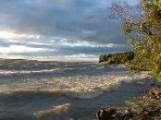Holland Marsh faces disaster with quick thaw, experts say
March 7, 2008
Conservation authorities are monitoring water levels in Lake Simcoe as one heavy rainfall or a quick thaw in the next few weeks could mean disaster for the Holland Marsh.
The warnings have brought back memories of 1954, when Hurricane Hazel flooded the marsh and washed away crops and homes.
"Let's put it this way. We're at a 40-year high on the lake, and the reason we're so high is that situation that we had in January where the extreme thaw put all the water into the basin," said John McCallum, an executive of the Holland Marsh Joint Municipal Service Board Drainage Committee.
That huge snowmelt on Jan. 8, which caused flooding and forced the evacuation of Huntsville residents, raised water levels in Lake Simcoe to 219.05 metres above sea level, just one centimetre shy of the lake's capacity.
Print Edition - Section Front
Enlarge Image
More National Stories
'Government has broken its own law' on species protection
Harper pledges to widen NAFTA leak probe
Schreiber loses extradition fight
Report blasts Ottawa's inaction on environment
Ottawa vows to block education tax shelter
Plan forged to stop tide of critically ill going to U.S.
Go to the National section
Since then, the drainage committee has been operating the dams at the outlet of the lake non-stop to get rid of the excess water. Two months later, they've managed to bring the water down by only 11 centimetres.
Dave Ness, a water-control engineer with the Trent-Severn Waterway, said recent heavy snowfalls and some very mild days haven't helped the situation.
"It can go up as much as eight centimetres in a 24-hour period, so you can easily cancel out all the headway we've made since January [with] one heavy rainfall," he said.
"The lake doesn't have the storage capacity to receive the freshet [waters produced by a thaw] that could potentially be generated this spring. If the lake goes higher than say it would normally, there could be the potential for nuisance flooding."
As a result, the Lake Simcoe Region Conservation Authority this week put out a notice to area residents to report any water spilling over dikes or roads in the marsh area, where the land is much lower than Lake Simcoe.
A major breach in the levee could easily flood the 7,000 acres of farmland. However, an emergency system that would involve reinforcing the earthen dikes with sandbags, Mr. McCallum said.
The canals were last dredged in 1955.
Tom Miedema, a farmer who grows onions and carrots on the Holland Marsh, said there has been concern among farmers in the area because certain dikes and banks are weak in places.
"The potential is there in certain spots. If a dike breaks, it could be bad," he said. "When we had hurricane Hazel, there weren't near as many homes and buildings here, so [a flood this year] would make a mess."




2 Comments:
Our packers and movers in Bangalore will charge you very reasonable and genuine for moving to another destination.
Packers and Movers India
http://moverspackersonline.com/packers-and-movers-bangalore/
http://moverspackersonline.com/packers-and-movers-delhi/
http://moverspackersonline.com/packers-and-movers-hyderabad/
http://moverspackersonline.com/packers-and-movers-chennai/
http://moverspackersonline.com/packers-and-movers-mumbai/
http://moverspackersonline.com/packers-and-movers-pune/
http://moverspackersonline.com/packers-and-movers-noida/
http://moverspackersonline.com/packers-and-movers-gurgaon/
http://moverspackersonline.com/packers-and-movers-ghaziabad/
http://moverspackersonline.com/packers-and-movers-faridabad/
kobe shoes
nfl jerseys
michael kors factory outlet
cheap rolex watches
michael kors outlet
true religion jeans
michael kors handbags sale
air huarache shoes
huaraches shoes
michael jordan shoes
ralph lauren online,cheap ralph lauren
air huarache shoes
black huaraches
cheap jerseys from china
kobe byrant shoes
air jordan retro
chrome hearts wholesale
fitflops sale
toms outlet store
michael kors outlet online
cheap nfl jerseys
chrome hearts online store
ugg outlet
christian louboutin outlet
tiffany and co outlet
christian louboutin outlet
fitflops clearance
jordan shoes on sale
retro jordans
oakley vault
kobe shoes
jeje
Post a Comment
<< Home